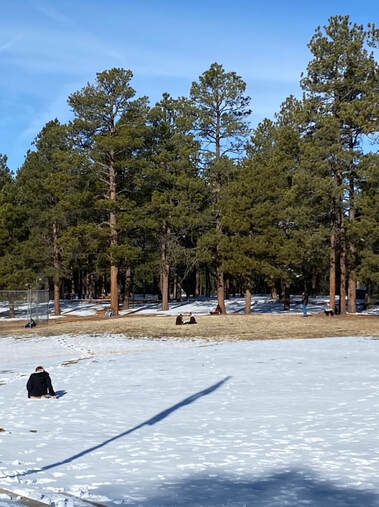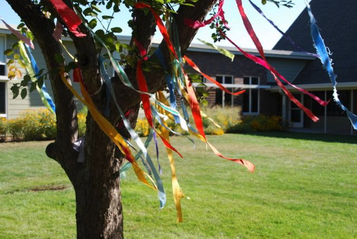 The theme of this year’s Spring Youth Retreat was “Stories.” While retreating in the gorgeous Black Forest, we spent our time focused on learning what it means to co-create our own stories with God, mostly by learning from each other. I had a great time building new and old relationships with other leaders and students across the UCC Rocky Mountain Conference. But on the first night, the camp staff reminded the adult leaders that the weekend was all about the campers first. So with that spirit in mind, I interviewed one of our students for this week’s reflection. I hope you enjoy this perspective as much as I did. Q: What do you want the church to know about the retreat? A: The retreat was so fun and super inclusive. The community and environment was so accepting, and it just felt like one big family. I made new connections right away! I honestly would love to go back. Q: What did you learn? A: The stories shared really gave a different perspective as well. it helped me learn that everyone comes from a different background, but they grow and change. Q: At Plymouth, we call some spiritual or Divine experiences “God sightings.” Did you have any “God sightings” this weekend? A: There was a moment in the chapel when stories were being shared where I genuinely felt the Divine’s/God’s presence. It was very powerful. It was almost like God was being shown through the stories, which made me feel like He was watching and giving people the courage to share their story. Q: Traditionally at La Foret, the older students lead all the younger students in a processional towards the chapel for worship. It’s a deeply reverent walk around the whole campground. Students were carrying flashlights and singing old hymns. What was it like for you to help lead the processional? A: It felt like one big family/community just genuinely connecting with God as well as each other. God’s presence was shown through the songs and connections. It’s hard to explain, but in a way it felt like everyone was at peace, and everyone was thankful to be able to connect with God through each other. Q: What is one big idea you’re taking away from the retreat? A: It is really easy to assume someone’s background story just by looking at them. And even though this is a very human thing to do, that doesn’t make it right. Everyone comes from a different background, but in the end we can always find support through each other and God. Community is very important. If you find one that’s accepting and inclusive, it’s the easiest to find God through it because it opens your eyes and makes you feel like you can have these connections without feeling judged. Instead of assuming, ask questions. It’s important to ask questions within someone’s comfort zone because it can help you really understand them better without assuming where they come from. Brooklyn AuthorBrooklyn is Plymouth's Director of Christian Formation for Children & Youth. Brooklyn has served in local church and student ministries for the past several years. A native of northern Colorado, Brooklyn has professional experience leading in worship, youth, and children’s programs. Read her full bio here.  Dear Plymouth, Three weeks ago it was my privilege to preach on the story from Mark 5 of Jesus healing the woman with the flow of blood and Jairus’ daughter. It is a long-loved, deeply felt Biblical text for me. I have told the Luke 8 version of this story (which is virtually identical to the Mark passage) for over twenty five years in worship and workshops. It was the first biblical story I internalized and committed to memory when I began studying the art of Biblical storytelling with the Network of Biblical Storytellers. It’s images of desperate pleas for healing, of risky acts, of skeptical disciples and neighbors, of pressing crowds, of Jesus’ compassion and vulnerable women have been working on me for many years. If you were with us in worship and heard the sermon at 10 a.m., or dialogued with me about the text at 6 p.m., you know that the image from the story that was driving my preaching that day was the image of telling the whole truth, telling the whole story of grief. The images of the hidden woman who came forward to tell the whole truth and the distinguished leader of the synagogue who bravely spills his whole truth at the feet of Jesus in front of a crowd are powerful. Telling their stories initiated and catalyzed healing, of self, of a loved one, of the community. Healing happens when we tell our stories. And if you were there you know that I briefly (and tearfully in the morning) shared part of my grief story and the healing journey I am on after the death of my son, Colin. (If you would like to read the sermon on our Plymouth website, click here.) Thank you for the graceful, heartfelt reception of my vulnerability that day! You all stood by me as faithful companions on the journey and I was very moved by that. You are my faith community and while I will not wear my grief on my sleeve, lest it hinder my ability to be with you as one of your ministers, I also want to and need to be vulnerable with you where it is appropriate. Its important for the healing of us all. So I urge us all to be more vulnerable in telling our faith stories of grief, of joy, of struggle with one another in safe and appropriate situations. And I want to make it clear that telling your story does not mean standing in front of a crowd! Crowds are not necessary. Tell your story to one trusted person. (Hal and Jake and I are available for story listening! We also have trained calling and caring visitors who are good listeners!) Tell your story in a small group, in a Christian formation class, at a fellowship event with a few trusted folks. Listen to your heart as well as your head and you will know when it is appropriate, when it is safe. Do not force yourself to share if you do not feel safe! With some stories confidentiality is very important. Share brief parts first and see how it goes for you if the thought of being vulnerable with your story is frightening. When you need to share more the opportunity will arise. It’s a learning process. God will lead you. And don’t be afraid to cry. In telling the story or in simply sitting with it in worship, tears can come. Heidi Haverkamp, author and Episcopal priest, writes of an experience when she was allowed to sit in the pew rather than lead worship during a time of crisis and cry. “What else is church for, if you can’t sit there and cry?...At Christmas we call Jesus Emmanuel, or “God with us.” To sit in my pew, tears and all, was a chance to bring my whole self and whole life into church with me and to feel part of the “us of “God with us,” instead of just crying alone at my house. I wonder if this could be a blessing for others, too, at the holidays or on any Sunday of the year, to sit and cry in church when we need to , to be God’s people all together, with all the joys and sorrow, smiles and tears, of human life, before the one who love us so much.” (Click here to read Heidi’s entire article in Christian Century, “Church is the perfect place to cry.”) What else is church for if it is not a community where we can safely be vulnerable? Where we can tell our stories to one another. Where we can shed tears of joy and sorrow. Let’s be church together. Blessings on the journey, Jane Anne AuthorThe Rev. Jane Anne Ferguson, Associate, Minister, is a writer, storyteller, and contributor to Feasting on the Word, a popular biblical commentary. She is also the writer of sermon-stories.com, a lectionary-based story-commentary series. Learn more about Jane Ann here. |
Details
|
 RSS Feed
RSS Feed